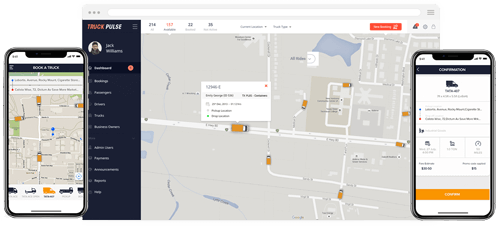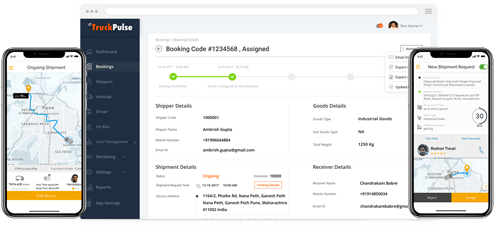The technology advancement has brought digital transformation to a number of industries. The digital trends have affected every industry, especially transport, logistics, and fleet management companies. Digital solutions such as cloud computing offer real-time data and increase the productivity of organizations.
The rise of competition and market conditions allow logistics businesses to make the most of available resources and finance. Moving to the cloud is a wise choice that enables you to increase performance and operational efficiency through digitization of equipment, personnel, and transaction sections.
Most of the companies who have realized the need have adopted cloud technology. In fact, IDC predicts that 67% of enterprise infrastructure and software will be cloud-based by 2020.
In this post, we will discuss the importance of cloud for fleet managers and find out how it can transform your fleet management.
Why is Cloud Computing Important for Fleet Managers?
- Rapid Growth
The logistics industry has experienced a high demand due to the rise of the on-demand economy and e-commerce. Companies with large fleet need a reliable solution to manage and control their operations effectively.
- Stiff Competition
Transport and logistics companies face tough competition with every business aiming to get the largest market share. Cloud computing offers an edge to organizations and enables to stay on top of the competition with smooth services.
- Cost Reduction
It makes sense to reduce costs as much as possible to increase profitability. Cloud-based solutions can be used for automation, streamlining operations and monitoring user activities and more- all of which contribute towards cost reduction and resource utilization.
Businesses are increasingly investing in cloud technology. IDC predicts that cloud computing investment will grow at 6 times the rate of IT expenditure through 2020.
13 Ways Cloud Computing can Transform Your Fleet Management Operations
- Real-Time Fleet Tracking

Having knowledge of where your fleet is and what they are doing is crucial for any logistics or transport company. Even a few years back truck fleet management would depend on calls and logs to track their fleet. Now, most of the companies have moved to some kind of software solution which connects with a central server and needs the drivers to log their details manually.
Such solutions don't tell you everything you need to know about your fleet. Issues like poor connectivity in remote areas also create a delay in the data transfer process.
A cloud-based fleet management system uses different technologies like GPS and sensors to give you real-time information of your fleet. Sensors like accelerometer and gyroscope let you track the speed of your vehicle and you can even see their current location on a map.
You can also get information on fuel consumption, engine condition, distance covered and other vital statistics about the vehicle. Analytics of the data helps to derive meaningful insights which help you ensure optimum operation of the vehicles. Cloud-based solutions can also track driving patterns like sudden acceleration or hard braking enabling you to identify responsible drivers.
Cloud helps you to accurately track your fleet along with other variables like environmental conditions, performance tracking, and asset tracking.
- Complete Overview of Operations
We just discussed how you can take your fleet tracking to the next level using a cloud-based fleet management solution. Apart from that, you can also stay on top of all your operations knowing what is going on.
For example, you can view the orders for each driver and the status of the jobs he is on. If any new order comes up, you can easily locate nearby drivers and assign the job instantly. The solution will also offer detailed reports on different aspects of your business and fleet which gives you knowledge of your day to day business.
- Forget Infrastructure Management
When you are running your own server, you have to maintain a physical IT infrastructure. You don't get any returns from it but have to employ qualified professionals to maintain and operate it. Many logistics companies find it difficult to invest, maintain and update their IT infrastructure.
Moving to the cloud allows you to get rid of your physical IT infrastructure. You can use the computational power of the servers for running applications along with storing and processing data. The cloud-based systems in the Saas (Software as a Service) model offer the versatility to be operated from both user and client end.
You can just use a browser on your computer to control your entire fleet.
- Meaningful Utilization of Data
A fleet management system generates a huge amount of data that can be used to keep an eye on every aspect of your fleet and discover areas that need attention. The data has to be processed properly to avoid slowing down the system.
You can improve the management of incoming data through the cloud and integrate them with data filtration tools. Fleet managers can define key points and get alerts about any variation that differs from the pre-defined rules.
The real-time data coming from the devices and sensors can be paired with data analytic tools to increase the connectivity, reliability, and functionality of the fleet. You can also make better and informed decisions based on the analysis.
Cloud-based fleet management software helps you to set custom rules according to your requirements. You can generate detailed insight about your vehicle including their location, status, and condition. In case any vehicle breaks down, you can take corrective measures quickly reducing any downtime. When a vehicle meets an accident, the control room can use the data to make an emergency dispatch.
You can improve your bottom line using the insights from your data.
- Streamline Operations
Cloud-Based fleet management helps you to streamline your operations. For example, you may no longer need the employees who acted as intermediaries for information exchange between the fleet and the management. Now drivers can update the status of their job and other information right from the field which is uploaded instantly on the cloud.
The fleet manager can get real-time information of the whole fleet in their fingertips. Streamlining your operations frees up more resources and time for important tasks of the business.
Moving to the cloud makes your organization flexible and increases productivity and profitability.
- Automate Processes and Tasks
You can eliminate the manual and repetitive processes in your operations by adopting cloud technology.
For example, your drivers don't have to submit their daily report to the managers or manually enter the details of their jobs. The cloud software can generate daily reports with full details like the number of jobs, order locations, routes taken, distance covered and other custom metrics.
Automation helps your employees and drivers to focus on the crucial aspects of the business rather than spending time with mundane tasks.
- Scale as You Grow
The growth of your logistic business should not be constrained by the limits of technology. An on-premise infrastructure is costly to upgrade and have to remain within certain boundaries of space and time.
Cloud enables you to free yourself from the task of complex upgrades and gives you the ability to scale as you grow. You can simply opt for additional space or computation power when your needs increase. Your organization doesn't need to pay huge upfront costs and can enjoy features like pay as you go.
- Improved Decision-Making
Fleet managers need concrete data to manage the fleet effectively. Sometimes, the transit of data can take some time or get interrupted by the loss of connectivity which forces the managers to make assumptions.
Cloud is designed to provide consistent performance with latency restricted to milliseconds. Cloud-based tools can also interact with the devices and sensors and communicate data even without the presence of the internet. Fleet managers always get up-to-date data to make informed decisions.
You can run analytics on your data on different parameters and get the results in dashboards and visual representations. The applications let you classify vehicles in your fleet which are prone to breakdown and need attention. You can combine the real-time data and valuable insights to make decisions effectively, schedule tasks, run smooth operations and enhance the economy of the organization.
- Optimum Use of Resources
All businesses want to use their resources to the fullest and cut down on exploitations. Cloud-based fleet management can help you monitor and control the different components of your business. You can use the admin panel to keep a tab on all your resources in action and find out any discrepancies during the process.
With the help of cloud solutions, you can standardize your operations, monitor fleet activities and brig on compliance. You gain control over your resources and can use them optimally.
- Secure Access On-the-Go
Users of your fleet management program can access the solution from any device when it is hosted on the cloud. You don't have to worry about matching specifications or using only compatible operating systems.
The devices like mobiles and tablets use authentication service to prevent unauthorized access so that the information and data of your business are always protected.
- Integration with Existing Infrastructure
Many logistics companies avoid upgrading their infrastructure because of cost and complexity. Cloud-based applications don't need you to change your existing infrastructure and you can integrate them with your existing system.
You can use bridging tools to connect your on-premise solution to the cloud reducing the cost and time of the business. You can also transfer your data to the cloud and filter them according to requirement.
The cloud-based solutions can be quickly implemented so that there is no interruption in your operations.
- Security and Business Continuity
Cloud infrastructures use built-in firewalls and security architecture to keep your data safe. They also come with reporting functionalities, expansive insights, and comprehensive recordkeeping applications to enable organizations to deal with any possible security threats.
Companies don't need to spend on security solutions which are provided by the cloud vendor along with the overall package. The security features can also be scaled as the data needs of the company grows.
Cloud fleet management also protects you from incidents of service outages through data mirroring and SaaS model. Your data is always protected and ready for use even if something goes wrong.
- Satisfied Customers
Cloud-based solutions are flexible and can be integrated with customer relationship management. You can integrate your fleet management solution with your CRM to help your customer service track the entire customer journey.
Contextual data from the CRM enables you to serve your customers effectively offering them a smooth and connected experience.
Conclusion
Cloud computing enables transport and logistics companies to stay competitive while reducing time and cost. Fleet managers can convert their existing infrastructure into a smart fleet management system delivering value to the customer and business alike. You can also scale the infrastructure as per your needs and pay for only what you use. Break out of the restrictions of legacy infrastructure by moving to the cloud!
Author's Bio



